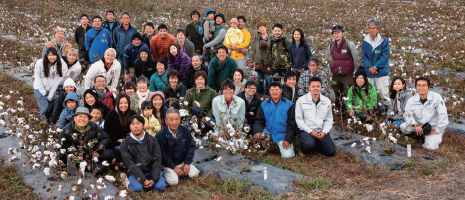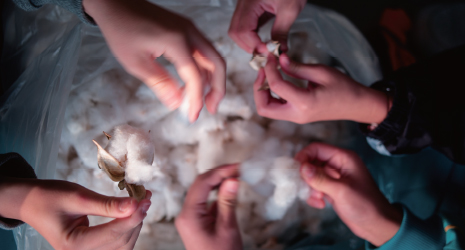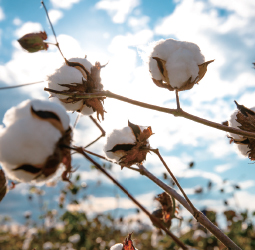Home > Highlighting JAPAN >Highlighting Japan March 2016>Five Years Down the Road to Reconstruction
Highlighting JAPAN


Fallow Fields No Longer
The Tohoku Cotton Project employs the creative thinking typical of the apparel industry to support local farmers in the tsunami-stricken regions by repurposing fallow rice fields to produce cotton and cotton goods.
At a nationwide cotton summit on May 10, 2011, Kenichi Kondo of the long-established Osaka-based textile company Taishoboseki Industries gave a presentation that would later inspire the launch of the Tohoku Cotton Project. The idea was for the apparel industry to support the stricken region by converting fields saturated with salt and unfit for rice production to raise cotton, which has a high resistance to saline. This would create stable employment opportunities for local farmers.
Over seventy companies and organizations are now involved in the cotton project and buying the cotton harvested at higher than market rates. The project offers local farmers seeds and cotton cultivation techniques while opening up opportunities to request government assistance toward agro-industrialization.
Yukihide Nakano, a photographer involved in the project, describes the initiative’s growth over the past five years. “People in the apparel industry are familiar with the beauty and feel of cotton,” he explains. “The idea began out of a simple appreciation for fluffy cotton and the desire to help local farmers in the disaster area harvest this beautiful plant.
“As the project gained traction, we realized that, in addition to its high-maintenance cultivation process, cultivating cotton in colder regions is challenging,” Nakano continues. “In the first year, we also sowed the seeds too late, so the crop was small. We harvested each plant one by one and used the cotton to make small quantities of towels and denim items.”
Cotton cultivation has been virtually nonexistent in Japan for the last fifty years. Hampered by water damage and pests, experimental cotton cultivation faced a series of difficulties. After the land was devastated by the tsunami, however, people were emboldened by the way cotton valiantly kept growing in salt-damaged land.
“We did not give up, and continued to learn from these insights,” Nakano says. “We saw the farmers and volunteers working together growing cotton, and people who had lost hope after losing their farms told us that they now felt enthusiastic about farming again.”
These efforts paid off. In 2015, the fields were covered with ripe cotton for the first time—clear evidence that the trial had succeeded. “The reconstruction has made gains, and rice cultivation has started up again in various areas,” Nakano says. “Since the start of the project, though, our aim has been to achieve sustainable support of the reconstruction. We limited the project to firms that would pledge long-term assistance, and the farmers we’ve worked with are enthusiastic about cotton as a product. These factors mean that the Tohoku Cotton Project will continue to grow.”
Firms not in the apparel business are also among the participating companies. They include Japan Airlines (JAL), for example, which not only sends personnel as volunteers to sow seeds and harvest the crop, but also makes some of its mileage reward offerings in part with Tohoku cotton. Additionally, department store Takashimaya is growing cotton on its roof and holding photo exhibitions to promote the project, drawing on its various strengths to enhance the brand image of the cotton products.
“We plan to expand harvests and partner with companies in the Tohoku region to develop newer and better products,” Nakano says. “Tohoku cotton, which grew in fallow fields, is a symbol of strength and reconstruction. We want to convey the idea of wearing and using Tohoku cotton as a symbol of courage.”
The notion of planting cotton in tsunami-damaged soil and making fields of fluffy white bloom is true to the creative sensibilities of the apparel industry. Paired with the branding support various firms offer, the project will no doubt continue to bear fruit.
© 2009 Cabinet Office, Government of Japan







